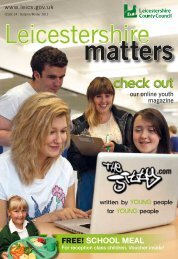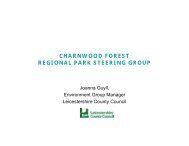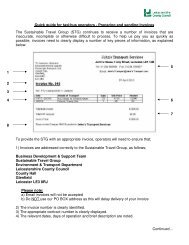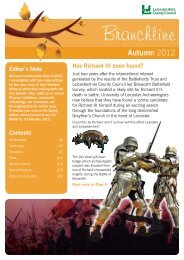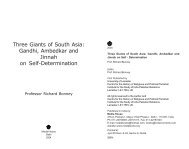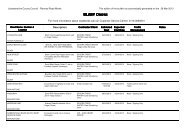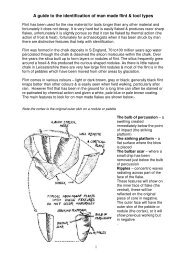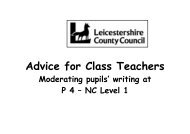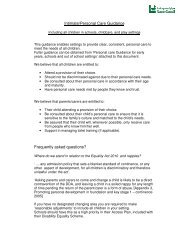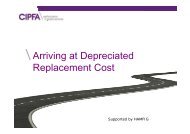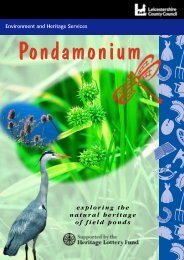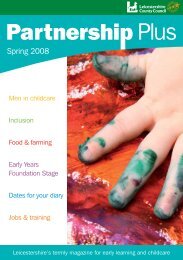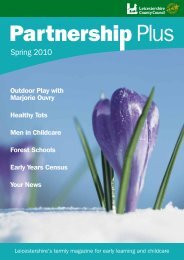Creative Writing Exercises - Leicestershire County Council
Creative Writing Exercises - Leicestershire County Council
Creative Writing Exercises - Leicestershire County Council
Create successful ePaper yourself
Turn your PDF publications into a flip-book with our unique Google optimized e-Paper software.
WORDS<br />
THINGS&<br />
Sensory exploration<br />
– we have 5 senses, often under-used.<br />
Objects and artworks can be used to<br />
explore:<br />
The sensory deprivation<br />
of disability or imprisonment.<br />
You can discuss how loss of any of the<br />
senses affects our impression of the<br />
world: of strangers, of places, sounds,<br />
etc. Learners could write a poem in<br />
which one colour is absent (for example,<br />
consider all the phrases that include the<br />
word ‘green’: how would we replace<br />
it, if we had no sense of green?), and<br />
then develop the exercise by writing a<br />
description of an object with no visual<br />
details, adjectives or facts.<br />
The evocative memories through smell.<br />
Two descriptions of the same place; one<br />
written using only smell, the other using<br />
all the senses except smell, will bring this<br />
aspect into relief. It could be interesting to<br />
discuss the different effects of the pieces,<br />
and how they bring the place to mind.<br />
Communicating without some<br />
of the 5 senses.<br />
Ask yourself if you’ve ever tried to have a<br />
conversation without speaking, and whilst<br />
wearing a blindfold (best for people who<br />
are not complete strangers!). Each person<br />
writes down what they were trying to say,<br />
and what they thought the other<br />
person said.<br />
Practical Workshop Ideas<br />
for Cross-Curricular Work<br />
As indicated in Section A - <strong>Creative</strong> Wordplay, the workshops which are at<br />
the heart of Words & Things are designed to support and enhance creative<br />
writing, but they can also be used in other ways.<br />
For example…<br />
All workshops which focus on objects or artworks also have the potential for:<br />
Alternatively, think of describing something<br />
visual without using any visual vocabulary,<br />
or describing a piece of music without any<br />
reference to sound. Ask simple questions:<br />
What does the internet taste of? What’s<br />
the sound of a watercolour? What colour<br />
would a jazz solo be?<br />
The challenges and opportunities of<br />
running workshops for learners who<br />
are sight - or hearing - impaired.<br />
These learners will often respond in<br />
different ways, and focus their descriptive<br />
work on different aspects of a solid object.<br />
A poetry engine exercise combining two<br />
of these approaches can be very powerful<br />
and effective.<br />
(See also Additional Support for Learners<br />
in this section and Using Museum<br />
and Artworks in Multi-sensory Ways<br />
in Section B).<br />
The investigation of sources:<br />
What? Where? When? and Why?<br />
These are questions which can structure<br />
discussions, research and observations<br />
in history, science and technology,<br />
sociology, politics, art and design,<br />
geography, economics, amongst other<br />
curriculum areas.<br />
Cultural comparisons<br />
Many classes and groups involve students<br />
from different countries or faiths.<br />
Section C<br />
136<br />
<strong>Creative</strong><br />
<strong>Writing</strong><br />
<strong>Exercises</strong>



